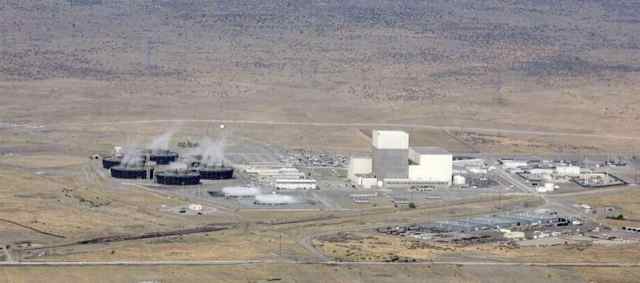forum
library
tutorial
contact

Petition Against Richland
Nuclear Plant Permit Denied
by Annette Cary
Tri-City Herald, September 20, 2014
|
the film forum library tutorial contact |

|
Petition Against Richland
by Annette Cary
|
 A petition challenging the cooling water permit issued to Energy Northwest's nuclear power plant near Richland has been denied, according to Energy Northwest.
A petition challenging the cooling water permit issued to Energy Northwest's nuclear power plant near Richland has been denied, according to Energy Northwest.
The decision was made during a hearing Friday afternoon in Thurston County Superior Court.
The permit, which allows the Columbia Generating Station to use and then discharge Columbia River water, was remanded back to a state agency, however.
Language will be added to to say that if the nuclear plant fails a toxicity test for water it discharges to the river, it will be in violation of its permit, said John Dobken, spokesman for Energy Northwest.
The toxicity tests are performed periodically, and the plant meets state standards, he said.
Three environmental conservation groups filed a petition with the court last October, challenging the nuclear plant's discharge permit issued by the state Energy Facility Site Evaluation Council.
The Northwest Environmental Defense Center, Northwest Environmental Advocates and Columbia Riverkeeper said the nuclear plant was discharging polluted water that violated state standards and that water intake structures could harm fish. They filed the action against the state agency, and Energy Northwest filed a motion to intervene in the legal action.
The three groups called for the five-year pollution discharge permit issued last year to be revoked and reevaluated, but did not seek to close down the nuclear plant.
Energy Northwest said making changes to its intake structures -- which it believes are unnecessary -- would have cost more than $20 million, mostly from lost power sales, because the nuclear plant would be required to shut down to make the changes.
Dobken called the legal ruling "a win for ratepayers."
The plant uses about 24 million gallons of cooling water from the Columbia River each day. That's about the amount of water that passes by its intake structure every 30 seconds, according to Energy Northwest.
The plant relies on a closed-loop cooling system in which cold water is cycled multiple times before it is discharged. The water is treated with additives to purify it and reduce corrosion. Before it is released back to the river, it is kept in a holding area to allow additives to dissipate.
When it is released to the river, there is virtually nothing in it, Dobken said.
The plant has used the same cooling water intake structure and system since it began operating more than 30 years ago. It has been in full compliance with the previously issued discharge permit and remains in compliance with the new permit, which requires additional monitoring, testing and reporting, Energy Northwest said.
The new permit requires Energy Northwest to prepare plans for a study on fish at the water intake structure by this November and to complete the study in May 2019, Dobken said.
A state fact sheet on Energy Northwest's application for the new pollution discharge permit said no adverse environmental impact has been demonstrated for the intake structures and that they were built to minimize impacts on fish. They are located well offshore, where there are few salmonid fry.
Plaintiffs in the legal action were not immediately available for comment late Friday afternoon.
Related Pages:
4 Things to Know About the Columbia Generating Station Lawsuit by Courtney Flatt, Oregon Public Broadcasting, 10/30/14
learn more on topics covered in the film
see the video
read the script
learn the songs
discussion forum
